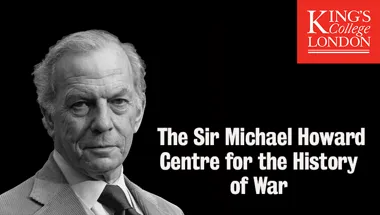
Dr David Easter
Senior Lecturer in War Studies
Research interests
- Conflict
- History
- Security
Biography
Dr David Easter is a Senior Lecturer in War Studies and the Academic Director for War Studies Online and Programme Director for MA War in the Modern World.
He holds a BA in History and Philosophy from Lancaster University, an MSc and PhD in International History from the London School of Economics and Political Science. He has worked as Lecturer and Tutorial Fellow in the Department of International History at the London School of Economics and as a Fellow at the Cold War Studies Centre/IDEAS.
Research Interests
- The Cold War
- Conflict in the Middle East and South East Asia
- British foreign and defence policy
- Signals intelligence
- Communications security
- Covert action
Teaching
Dr Easter currently teaches the following War Studies Online MA modules:
- Intelligence in War and Peace
- History of Contemporary Warfare 1: the Early Cold War, 1945-1975
- History of Contemporary Warfare 2: from Cold War to War on Terror, 1975-2011
- He also teaches on the campus MA module Intelligence in Peace and War.
PhD Supervision
Second supervisor Sarah Louise-Miller. Thesis topic is ‘The Contributions of the WRNS and WAVES to British and American Naval Communications and Intelligence in the Second World War’.
Expertise and Public Engagement
Dr Easter is currently focused on Indonesia in the Cold War. At present he is working on the following projects:
1. ‘Soviet military involvement in the 1962 West Irian Crisis’. This paper examines Soviet military support for the Indonesian campaign to take West Irian (Dutch New Guinea) from Holland. It shows that in addition to supplying large amounts of military equipment, the Soviets were willing to crew Indonesian submarines and jet bombers. Furthermore, Moscow appears to have actively encouraged Indonesia to go to war with Holland over West Irian in 1962. The paper concludes by assessing the reasons for the USSR’s aggressive policy in the West Irian Crisis.
2. ‘Living Dangerously: Sukarno’s Indonesia in the Cold War, 1957-1967’. This monograph looks at the impact of the Cold War on Indonesia from the Outer Islands Rebellions to the removal of Sukarno in 1967. It analyses the policies of President Sukarno and Indonesia’s relations with the superpowers and regional powers, such as Britain, China, Australia and Malaysia. It considers why Sukarno aligned Indonesia with the USSR and communist China and examines how the Western powers sought to oppose him. By examining issues such as CIA support for the rebels in the 1957-58 rebellions, the West Irian Crisis, Konfrontasi, the anti-communist mass killings of 1965-66 and the army’s seizure of power, the book shows that Indonesia was both an subject and object in the Cold War, Sukarno sought to achieve his external and internal goals by exploiting the Cold War international environment but he eventually fell victim to pressures from the Western powers and his domestic right wing. Indonesia thus provides an interesting case study of how the Cold War affected Developing States and interacted with decolonisation and anti-imperialism.
Publications
Books
- Britain and the Confrontation with Indonesia, 1960-1966, (London: I.B.Tauris, 2004).
Book chapters
- ‘’Western Intelligence and Covert Soviet Military Aid to Indonesia During the 1962 West New Guinea Crisis’ in
- Perspectives on Military Intelligence from the First World War to Mali, Baudet, F., Braat, E., Van Woensel, J. & Wever, A. (eds.). (2017), The Hague: Springer, p. 77-95.
Research articles
- ‘The impact of ‘Tempest’ on Anglo-American communications security and intelligence, 1943-70’, Intelligence and National Security, (2021), 36, 1. https://doi.org/10.1080/02684527.2020.1798604
- ‘Protecting Secrets: British diplomatic cipher machines in the early Cold War, 1945-1970’, Intelligence and National Security, (2019), 34, 2, p. 157-169. https://doi.org/10.1080/02684527.2018.1543749
- ‘Soviet intelligence and the 1957 Syrian Crisis’, Intelligence and National Security, (2018), 33, 2, p. 227-240. https://doi.org/10.1080/02684527.2017.1370072
- ‘Soviet Bloc and Western bugging of opponents’ diplomatic premises during the early Cold War’, Intelligence and National Security, (2016), 31, 1, p. 28-48. https://doi.org/10.1080/02684527.2014.926745
For a list of publications please visit the Research Portal
Research

Sir Michael Howard Centre for the History of War
The centre promotes the scholarly history of war in all it's dimensions, trains research students and hosts research projects and conferences

King's Centre for the Study of Intelligence
King's Centre for the Study of Intelligence provides a platform for sharing research and ideas in the field of intelligence.
Research

Sir Michael Howard Centre for the History of War
The centre promotes the scholarly history of war in all it's dimensions, trains research students and hosts research projects and conferences

King's Centre for the Study of Intelligence
King's Centre for the Study of Intelligence provides a platform for sharing research and ideas in the field of intelligence.
